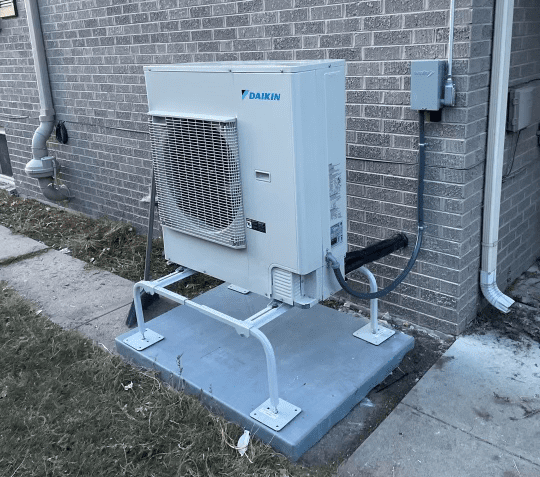
As homeowners in Colorado increasingly seek energy-efficient solutions for heating and cooling, heat pumps have emerged as a compelling option. The question on many minds is whether investing in a heat pump will lead to substantial savings. In this blog post, we’ll delve into the key factors that determine whether a heat pump can indeed save you money in the long run.
Understanding Heat Pump Basics
Before we dive into the potential savings, let’s briefly explore how heat pumps work. Unlike traditional heating systems that generate heat, heat pumps transfer heat from one place to another. In the winter, they extract heat from the outside air (even in cold temperatures) and move it indoors to warm your home. In the summer, the process is reversed, with heat pumps extracting heat from indoors and expelling it outside to cool your home. This dual functionality makes them a versatile and energy-efficient choice.
Factors Influencing Savings
Several factors come into play when determining the financial benefits of a heat pump. Consider these key elements to assess whether a heat pump is likely to save you money in the long run:
- Energy Efficiency Ratings: Heat pumps come with two main efficiency ratings: Heating Seasonal Performance Factor (HSPF) for heating and Seasonal Energy Efficiency Ratio (SEER) for cooling. Higher HSPF and SEER ratings indicate better efficiency. Investing in a heat pump with a high HSPF and SEER can result in lower energy consumption and, subsequently, reduced utility bills. Depending on the type of heat pump, there is staging of heat output. A single stage will put out all the output on every single call for heat or cooling, compared to two-stage or variable staging, which will stage the output based on what the home needs depending on the setting on the thermostat.
- Local Climate: The climate in your region significantly influences the performance of a heat pump. Heat pumps are generally more efficient in moderate climates. In areas with extremely cold temperatures, the system may need additional support from a secondary heating source during the coldest months. Understanding how well a heat pump performs in your local climate is crucial for accurate cost assessments. Going along with the local climate, it is also important to ensure your contractors are proposing the appropriate heat pump for your climate. Not all heat pumps are best for each climate. For instance, there are cold climate-specific heat pumps designed for areas like Denver, Colorado, electrification heat pump projects. These heat pumps do not lose as much capacity as the temperature drops, unlike the cheaper heat pump equipment designed for climates in the south, such as Texas, Florida, Louisiana, etc.
- Insulation and Home Efficiency: The overall efficiency of your home, including insulation, windows, and doors, plays a pivotal role in determining the effectiveness of a heat pump. A well-insulated home retains heat more effectively, reducing the workload on the heat pump. Investing in home improvements to enhance energy efficiency can complement the savings potential of a heat pump. If you are doing any home remodeling, it is important to seal and insulate the envelope of your project as much as possible if you are considering converting to a heat pump in the future. The tighter the envelope, the fewer BTUs we need to heat the home. This can reduce upfront costs of installation by requiring smaller equipment and electrical circuitry to heat/cool the home.
- Fuel Costs: The cost of electricity compared to other heating fuels in your area is a crucial consideration. In regions where electricity costs are relatively low compared to fossil fuels, heat pumps are more likely to provide substantial savings. Evaluate the current and projected costs of different energy sources to make an informed decision. This is likely the largest factor affecting the cost to operate your heat pump. If you live in an area where gas is cheaper than power, you may want to look elsewhere for methods to heat your home. However, if you are in an area that has large incentives to convert to electric, it is likely that power prices will fall over time.
- Usage Patterns: Your heating and cooling needs, as well as usage patterns, impact the overall savings. Heat pumps are highly effective for homeowners with consistent heating and cooling requirements. If you frequently adjust your thermostat or have irregular heating and cooling demands, the system may not operate at its optimal efficiency, affecting potential savings. Another huge factor that affects the cost of usage is how the installing contractor sets the equipment up. Some heat pumps do not heat well in cold climates, and a backup furnace is required. If you go with one of these Dual Fuel (Heat Pump & Natural Gas) systems, it is important to properly set up the turnover temperature of when the heat pump shuts off and when the gas furnace kicks in. Too low of a changeover temperature could result in higher electric bills. All of these factors contribute to how much you financially benefit from your new heat pump system.
Advantages of Heat Pumps
Now, let’s explore the specific advantages that contribute to the cost-effectiveness of heat pumps:
- Energy Efficiency: Heat pumps are renowned for their energy efficiency. By extracting heat from the outside air or ground and transferring it indoors, they can provide more cost-effective heating than a comparable electric resistance heating furnace. This high efficiency leads to lower energy bills compared to traditional heating and cooling systems, such as electric heating options.
- Dual Functionality: The ability of heat pumps to both heat and cool makes them versatile throughout the year. Instead of investing in separate heating and cooling systems, a heat pump provides a comprehensive solution. This dual functionality can result in overall cost savings and reduced maintenance expenses.
- Long-Term Savings: While the upfront cost of installing a heat pump may be higher than traditional systems, the long-term savings could offset this initial investment. With proper maintenance and efficient operation, heat pumps often prove to be a financially savvy choice over their lifespan. Further, heat pumps generally are less expensive to maintain over condensing furnaces or boilers.
- Environmental Impact: Heat pumps are environmentally friendly, producing fewer greenhouse gas emissions compared to conventional heating systems. If environmental sustainability is a priority for you, the reduced carbon footprint of a heat pump adds to its overall appeal. Many cities around the country, such as Denver, Colorado, have already implemented electrification efforts and rebates to assist people in reducing their carbon footprint by utilizing heat pump technologies
Does a Heat Pump System Provide Financial Benefits in Colorado?
In assessing whether a heat pump will save you money, it’s essential to consider the specific factors influencing performance and efficiency. Energy efficiency ratings, local climate, home efficiency, fuel costs, and your usage patterns all play integral roles in determining potential savings. Additionally, the inherent advantages of heat pumps, such as their dual functionality, long-term savings, and environmental benefits, contribute to their appeal as a cost-effective heating and cooling solution.
Before making a decision, consult with Vectra Mechanical, HVAC, Electrical and Plumbing to assess your specific needs, local climate conditions, and the overall suitability of a heat pump for your home. By carefully considering these factors, you can make an informed choice that not only aligns with your budget but also provides sustainable and efficient heating and cooling for years to come.



